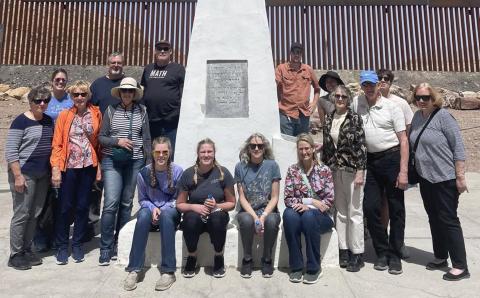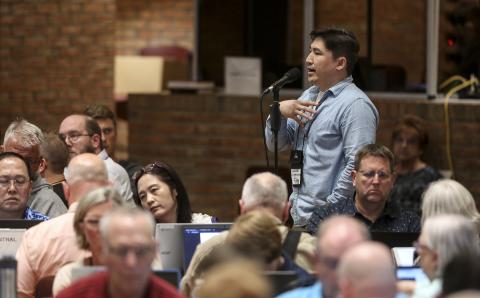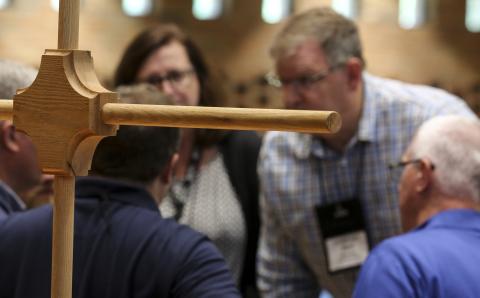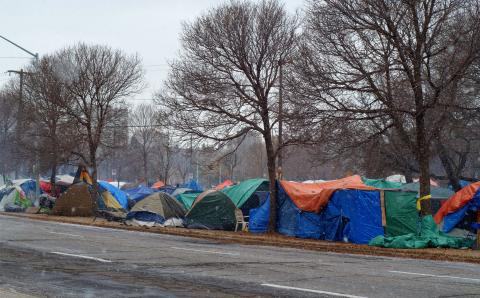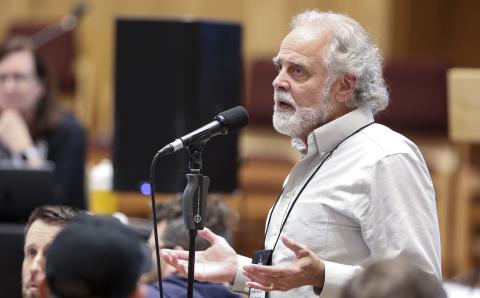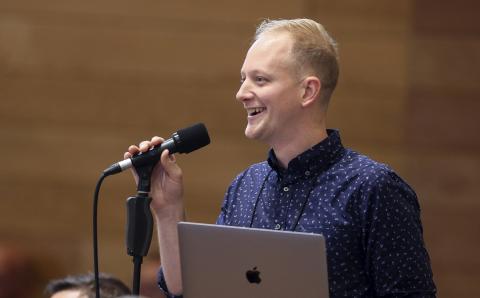Following worship led by Synod 2023’s host congregation, Church of the Servant, in Grand Rapids, Mich., delegates to the Christian Reformed Church’s general assembly received welcome from Church of the Servant pastor Karen Campbell, who chaired the gathering until the officers for Synod 2023 were elected.
Campbell invited Calvin University president Wiebe Boer to offer a greeting from the university on whose campus synod is meeting. Boer, who was born in Nigeria while his parents were on the mission field as Christian Reformed missionaries, finds the work of synod deep and important. He recalled his dad receiving the Agenda and Acts of Synod by mail, “many months after the work was complete,” but they were volumes given respect because of the significance of the work of the body. Before closing with a blessing spoken in Hausa, the language of the CRC of Nigeria, in which he was baptized, Boer reminded those gathered, “We are your university. This is your campus.”
Expectations regarding confessional subscription for Calvin faculty will be addressed at this synod, raised in formal requests from five different regional groups of churches (Overtures 50, 51, 54, 55, and 64, starting on p. 529 of the Agenda for Synod 2023.) Calvin’s response, Appendix E of the agenda supplement, also will be considered.
‘Prop Each Other Up’
Before any other work, Campbell invited Sean Baker and Amanda Benckhuysen, who work in the areas of Pastor Church Resources and Safe Church for Thrive, the CRC’s group of congregationally focused ministries, to lead delegates through 30 minutes of power and privilege training. Begun last year, the practice was called for by Synod 2019, whose task force recommended several improvements to foster “the best possible environment for synod to function,” as Benckhuysen described it. She read 1 Cor. 12:12-25 and asked delegates to consider that the people around the tables come to synod with varying degrees of belonging that can impact interactions, but they ought not to consider any as not part of the body.
Baker reviewed a leadership style grid with four quadrants, saying Christian leaders did not have the choice to be anything but the top right corner: having deep compassion and strong convictions with a “restorative” leadership. Other default styles: authoritarian, neglectful, or permissive, are to be worked against. He encouraged delegates—who include pastors, elders, and deacons delegated from each of the 49 classes (regional groups)—to “prop each other up” over the course of their work together. “Find ways to treat the people around you as the very essential parts of the body that the apostle Paul describes,” Baker said. He encouraged delegates to move at a “measured pace,” not too fast or too slow but so that the process would be as clear as possible and no one would feel “swept along or left out.”
“We can trust God enough that we don’t need to sacrifice grace to get to true outcomes,” Baker said.
Working in one of eight advisory committees, delegates will deliberate over specific parts of the agenda assigned to them for much of June 9 and 10. Synod 2023 will take up recommendations from those committees later in the synod week.
Synod 2023 is meeting June 9-15 at Calvin University in Grand Rapids, Mich. Find daily coverage from The Banner news team at thebanner.org/synod. Visit crcna.org/synod for the synod schedule, webcast, recordings, photos, committee reports, and liveblog. Synod is the annual general assembly of the Christian Reformed Church.
About the Author
Alissa Vernon is the news editor for The Banner.


